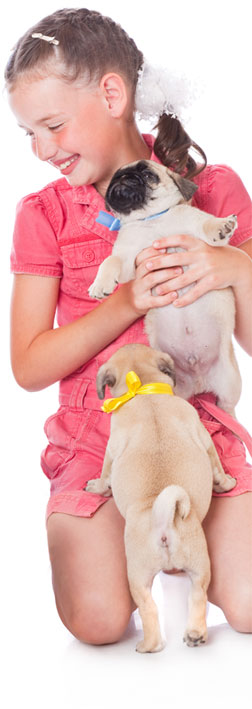If you see this icon in a fact sheet summary you may be dealing with a life threatening issue. Consult a veterinarian immediately.
Use our webform to ask a question or book an appointment

KENNEL COUGH
Kennel cough, or infectious canine tracheobronchitis, is a highly contagious* condition in dogs that affects the throat, trachea (windpipe) and, on rare occasions, the lungs. It is most commonly characterised by a persistent, dry, harsh hacking cough, often producing white frothy saliva, which can lead pet parents to mistake the coughing for vomiting.
Kennel cough can be caused by a variety of different viruses or bacteria, but is most commonly triggered by the presence of both the parainfluenza virus and the bacteria Bordetella bronchiseptica. Although dogs can be largely protected by routine annual vaccinations, unfortunately, we can only vaccinate against these two most common strains. Some dogs vaccinated for kennel cough can still contract the disease. However, in vaccinated dogs the disease is generally a lot milder and not as prolonged as in those animals not vaccinated. It is also much less likely that the disease will progress to pneumonia if the dog is vaccinated.
Kennel cough is highly contagious. It is transmitted by respiratory secretions by direct nose to nose contact or via aerosol transmission — sneezing or coughing. It occurs most frequently in kennelled dogs because they spend a lot of time barking at each other, hence the name. However, dogs can also contract it just by sniffing noses through a fence or while on a walk.
In many cases the infection may run its course and the dog recover without treatment. However, due to the risk of pneumonia, we do strongly recommend that all dogs suffering kennel cough are treated, and vaccinated if necessary. The infected dog must be isolated from other dogs while the condition remains.
*Important! If your dog has any kind of cough and you are making an appointment to bring him or her to the clinic for a checkup, please inform us about the cough. We will ask you to wait in the car for a vet to check your dog before he/she comes into the hospital. You’ll be helping us avoid exposing other patients to a potentially infectious condition.
SEVERITY: Potentially serious but rarely life threatening.
The cough normally has a sudden onset and occurs within 3 to 10 days of being in kennels or having been exposed to an infected dog. Most dogs will appear healthy apart from the annoying cough.
The majority will also have a fairly normal appetite although some may refuse food, become lethargic and may have a fever. On very rare occasions, and depending upon the bug which caused the disease, kennel cough can spread to the lungs and cause pneumonia.
Diagnosis is generally straightforward and requires only a visual and auditory examination together with a history of any time spent in a boarding kennel or shelter. In some cases we may take bacterial cultures, viral isolations, and bloodwork to identify the specific pathogens causing the exact type of kennel cough the dog has. X-rays, which can show bronchitis, are occasionally used.
Treatment for kennel cough is designed to give your dog relief, shorten the course of the disease and help prevent pneumonia. Treatment may include a short course of antibiotics and, if required a cough suppressant. An anti-inflammatory injection may also be given to help ease the throat.
The cough should start to improve within 3-5 days of beginning treatment, although sometimes the cough can get a lot worse before it improves. Any deterioration in your dog’s health should be brought to our attention as it may be a sign of developing pneumonia and we may recommend chest radiographs to confirm this.
Due to the extremely contagious nature of this disease it is important to keep your dog away from other animals for 2 weeks after the cough has resolved. It is also important to keep your dog confined and limit exercise as activity tends to irritate the windpipe further, which in turn worsens the cough. Also make sure your pet is kept warm, especially at night as cold air also tends to irritate the throat further.
MORE DISEASES OF DOGS
DOGS: ADVICE FOR EMERGENCIES


